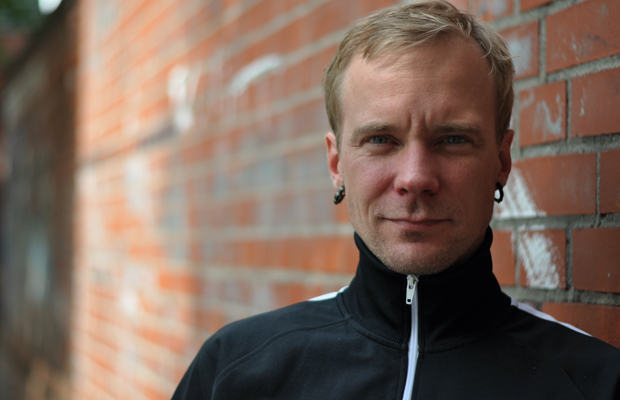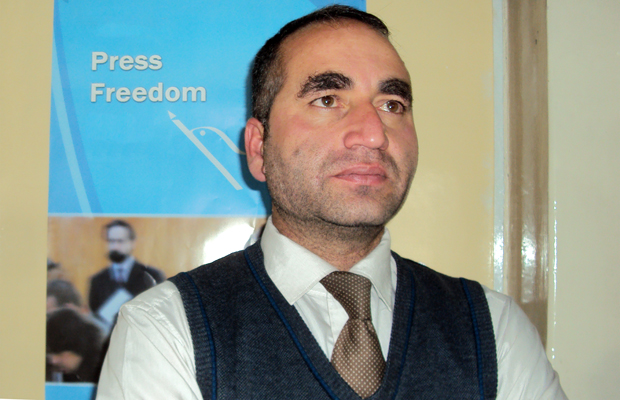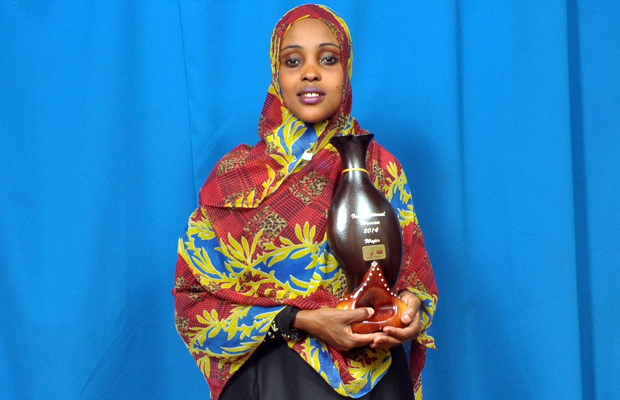6 Mar 2015 | Awards, Germany, mobile

Fabian Wichmann from campaigning nominee ‘Rechts gegen Rechts’ and ZDK
Rechts gegen Rechts (Nazis against Nazis) is an initiative set up in 2014 in Wunsiedel, Germany, to peacefully counter an annual neo-Nazi march through the streets of the small town. It arranged for money to be donated to an anti-extremism charity for every metre that the marchers walked, so that the neo-Nazis were effectively marching against themselves.
The campaign was started by Zentrum Demokratische Kultur‘s Exit Germany project, which seeks to support extremists looking to exit the movement.
“For 15 years we have been fighting for funding to support Exit Germany’s programmes”, Fabian Wichmann of ZDK said. Wichmann cited funding as a key issue but also highlighted the difficulties of reintegrating former neo-Nazis.
Wunsiedel was the burial place of Hitler’s deputy Rudolf Hess, prompting far-right pilgrimages on every anniversary of Hess’s death since he committed suicide on 15 November 1987. Despite opposition from the townspeople, the marchers returned every year, even after Hess’s bones were exhumed and cremated on his family’s request.
Throughout Germany, far-right marches often lead to violent clashes with leftist groups – for example, 700 right- and left-wing extremists were arrested after a 2012 march in Hamburg. The government’s attempts to block far-right groups from marching – as happened in Wunsiedel in 2005 – have been criticised as being restrictive of free speech.
The Rechts gegen Rechts campaign organisers proposed a new approach, which was both non-violent and accommodating of the marchers’ rights to free expression. Using funds donated by local residents and businesses, it sponsored the neo-Nazi marchers €10 for every metre that they walked. The total sum of €10,000 – plus money raised during the march – was given to Exit Germany, a charity which rehabilitates neo-Nazi defectors.
The demonstrators were oblivious to the fundraiser until they began the march, in which they stepped across painted messages in the road which told them how much money they had raised so far. Motivational banners were also placed along the route. One played on the Hitler Youth motto, reading: “Swift as a greyhound, tough as leather, and generous as never before”.
In an imitation of conventional walkathons, a banana stall offered nutrition to the 300 marchers under a banner reading ‘Mein Mampf’ (‘my snack’). At the finish line, the far-right marchers were showered with confetti and given a certificate outlining where the money they inadvertently raised had been directed.
Exit Germany, who helped organise Rechts gegen Rechts, was founded to give help to people trying to leave extremist groups, but who worry about losing their support structure, or fear retaliatory action. Its innovative work in Wunsiedel aimed not only to raise funds, but also to raise awareness among the marchers themselves that defection was possible.
Umbrella organisation Zentrum Demokratische Kultur was founded in 1997 and works with radicalised individuals from two separate spheres: Islamic fundamentalism and Germany’s far right.
“It’s a big honour for us to know that we were on the Index shortlist. For 15 years we are fighting for dignity, for free speech for people”, Wichmann said.
This article was posted on March 6, 2015 at indexoncensorship.org
5 Mar 2015 | Awards, mobile, Russia
Soldiers’ Mothers of Russia is an NGO network dedicated to improving transparency and exposing human rights abuses in the Russian military. It aims to provide soldiers’ families with reliable information, which the notoriously secretive Russian military has kept private. It also provides legal advice for Russian soldiers and their families, and to conscientious objectors.
“The organisation operates from general principles of human rights and the rule of law. We are in favour of contract service for the Russian armed forces whereby men are recruited on the basis of their intellectual, physical and spiritual readiness. We speak out against forced conscription and believe a transition to a professional army would significantly improve human rights and relations between the military and civilians,” Ella Polyakova from Soldiers’ Mothers St. Petersburg branch told Index on Censorship via email.
The Soldiers’ Mothers groups were established in 1989, in the last days of the Soviet Union. One of their first responsibilities was to personally negotiate for political prisoners left behind by the Russian army in former socialist republics. The group also calls attention to brutal “dedovshchina” or hazing tactics used on junior soldiers, ranging from beatings and sexual abuse to torture and enslavement. Because the abuse is perpetrated by senior officers, it often cannot be officially reported, leading to distorted figures. For example, in 2010 the committee reported 2,000 deaths from hazing, while Russia’s Defence Ministry declared only 14.
Vladimir Putin has insistently denied that Russian forces have had any involvement with Ukraine’s civil war, in which pro-Russian separatists have been fighting government forces since April 2014. Officially, any Russian soldiers fighting in Ukraine are volunteering, not acting on behalf of the Kremlin – in December 2014 Putin described such men as answering “a call of the heart”.
The secrecy surrounding the disappearances of soldiers has mirrored past operations by the Russian military. During conflicts in Afghanistan and Chechnya in the 1980s and 1990s, the Russian army only landed planes carrying soldiers’ bodies at night, to cover up escalating casualty figures.
From August 2014, Soldiers’ Mothers members began revealing that their investigations had found that many wounded or killed Russian soldiers had been fighting in Ukraine. Head of the committee Valentina Melnikova announced that her research showed that between 10,000-15,000 Russian troops had been sent over the border in August. Her information was derived from mothers and wives of servicemen who were sent on military exercises close to the Ukraine border, and who subsequently stopped communicating with their families.
There has been a systematic silencing and smearing of committee members who have reported on Ukraine deaths. Lyudmila Bogatenkova, head of the Budennovsk branch of Soldiers’ Mothers, was arrested and charged with a four-year-old fraud conviction, after she announced that 11 Russian soldiers were killed fighting in Ukraine. After her release she had to be treated in hospital.
Polyakova demanded a government investigation after receiving information about 100 Russian soldiers allegedly killed and 300 wounded in Ukraine. Soon after, her branch was labelled a “foreign agent” by the government – even though the committee of Soldiers’ Mothers no longer receives foreign funding, one of the prerequisites of the classification. Her committee faces serious problems as a result, including being subjected to complex reporting requirements, and additional inspections and controls.
“To make matters worse, after the organisation was put on the register, a film crew from a state television channel burst into our offices and blackened us with dishonest coverage of our work,” Polyakova told Index. “Later that night, someone smashed the windows of our director Olga Alexeeva’s car. Human rights activists linked to Soldiers’ Mothers received many threats and insults by text message and email.”
But despite the pressures they face, they intend to continue their work, and also set up “a human rights information and analysis agency” to increase contact with other NGOs and the media.
“We are glad that we are able work effectively to defend human rights and to take part in positive changes in the lives of our citizens,” the group said of their Index award nomination. “It is nice to know that this work is valued by our colleagues.”
With additional reporting by Will Haydon
4 Mar 2015 | Afghanistan, Awards, mobile

Campaigning nominee Abdul Mujeeb Khalvatgar
Abdul Mujeeb Khalvatgar is an Afghan journalist and the executive director of the media advocacy group Nai Supporting Open Media in Afghanistan, which works to develop a free media as the country develops a peacetime society. A radio journalist for more than 10 years, he began his career with the Internews Network in 2002 and then as general manager for a national radio channel, Salam Watander.
Khalvatgar has been a tireless campaigner for a free and fair Afghan media. Nai is the only organisation in the country to monitor violence against Afghan journalists. It has offered basic training to around 10,000 Afghan journalists, teaching investigative reporting, TV hosting and technical skills. Nai also runs a network of all-female radio stations, which Khalvatgar helped set up.
The Afghan media sector has grown from having only 15 media outlets in 2000 to almost 1,000 in 2014. With this growth, new challenges have arisen. Since 2001 more than 40 journalists have been killed in Afghanistan and hundreds of attacks on members of the press have been recorded. Many of these are believed to have been perpetrated by the government. Operating in a well-documented atmosphere of violence and hostility, Khalvatgar aims to strengthen Afghan democracy by being one of the founding fathers of a free media in the country.
“The problem here is that on the one hand, the government of Afghanistan are trying to push and pressurise as much as possible the environment for free expression and free media. On the other hand the terrorists, the Taliban, are trying to silence the people who are working as journalists, who are working as media activists and those who are trying to support them,” Khalvatgar told Index on Censorship.
Her says insecurity is one of the main problems facing Afghan journalists. “Just 20 kilometres outside of Kabul it is sometimes not possible to report on what is going on,” he says, adding that outside the big cities, journalist have to self-censor for fear of the local government, local powers, and in south and east of the country, the Taliban. Even in big cities, he explains, it is sometimes difficult to investigate stories related to corruption in depth “because you don’t feel safe to do it”. He also highlights impunity for crimes against members of the press, the undefined relationship between media owners and journalists and the lack of access to information as challenges to media freedom.
Khalvatgar joined Nai as executive director in 2010, a position he still holds. He is part of Afghanistan’s Foundation Open Society Institute, working as media coordinator and acting country manager, as well as an active member of Access to Information Law Working Group, a collective of more than 15 media professionals and activists working for better access to information law in Afghanistan. He spent the better part of 2012 successfully campaigning to get a government draft law withdrawn that would have dampened media freedom and given more power over the press to conservative bodies. He also helped launch Afghanistan’s first media awards, as well as its Legacy Fund, which raises money for families of Afghan reporters who have been killed. And he is doing this work at great personal risk.
“I have had threats from Taliban that they want to kill me; threats from the government of Afghanistan that I do not criticise the government; threats from the local powers to not touch the kind of hegemonies that they have,” he lists. “But I do believe in what I’m doing. And I do love what I’m doing. So any kind of threats will not stop me.”
Khalvatgar says he is delighted about the Index award nomination, but true to form, his focus on is on his country’s media community. “If I win this award, it is an award for the people; for 49 journalists who have been killed in Afghanistan, for their families, for the almost 12,000 people that are working in the media sector in Afghanistan.”
This article was posted on March 4 2015 at indexoncensorship.org
3 Mar 2015 | Awards, Fellowship 2015, Kenya, mobile

Campaigning nominee Amran Abdundi
Amran Abdundi is a women’s rights activist based in northeastern Kenya. She runs the Frontier Indigenous Network, an organisation which mobilises female peace builders and rights activists to set up shelters along the dangerous border with Somalia. It offers first aid to the injured as well as to women and girls who have been raped, moving victims to a safer part of Kenya.
As well as protecting citizens endangered by the guerrilla activities of the Al Qaeda-linked group Al Shabaab, Abdundi and her organisation also help those fleeing drought and failed harvests in Somalia. Abdundi is also behind radio-listening groups for women, which share information about access to tuberculosis treatment, among other things.
In a society that teaches women to leave decision-making to men and to look down when men pass, Abdundi’s Frontier Indigenous Network empowers, educates and mobilises rural women to challenge such outdated social codes.
The Al Qaeda-allied Islamist group Al Shabaab has sown terror in the Kenya-Somalia border region, one of the world’s most inhospitable areas. Women in the region are often the victims of violence, rape and murder. The northern region of Kenya is one of deeply conservative social customs, in which a man owns property on a woman’s behalf – even when the woman has bought the land. In the environment Abdundi operates in, a quarter of Kenyan girls and women have endured genital mutilation, despite legislation outlawing the practice.
Abdundi told Index: “I want to see them go to school. I don’t want to see them moving here and there without education – early marriage and female circumcision are also major issues.”
She said that some of the initial challenges the organisation faced have been overcome. In the beginning it was hard to talk to parents about their girls and “how the women have suffered”, she explained. “But now they understand us. They know how good we are and we want to change their lives.”
One of Frontier Indigenous Network’s biggest achievements in 2014 has been in mapping out conflict areas in northern Kenya. It focuses on the factors which fuel armed violence occurring after peace agreements are signed between warring parties. Aware that small arms and light weapons were one of the biggest obstacles to peace in the region, Abdundi and her group mapped many of the weapons used by the combatants. She then instigated a regional agreement to pursue arms traffickers, closing boltholes used by smugglers along the Somali border and developing a register of all recovered weapons. The agreement also targeted a network of groups running an illegal arms trade.
Abdundi has established radio-listening groups specifically for women, in which she encourages them to challenge the repressive cultural values preventing women from being permitted to own property or livestock. She uses the radio groups to reach women with tuberculosis, educating them about access to treatment and breaking cultural beliefs that tuberculosis is caused by curses and bad omens.
Abdundi has also mobilised women along the Kenya-Somalia border to rise against Al-Shabaab, a militant terrorist group, by educating them on the dangers of following the doctrine propagated by the terror organisation; she has received a number of death threats as a result of this work. She has also campaigned against the practice of female circumcision in northern Kenya.
She said: “My dream is to help women, girls and children. I just want to see them doing good. That’s my dream.”
This article was published on March 2, 2015 at indexoncensorship.org



